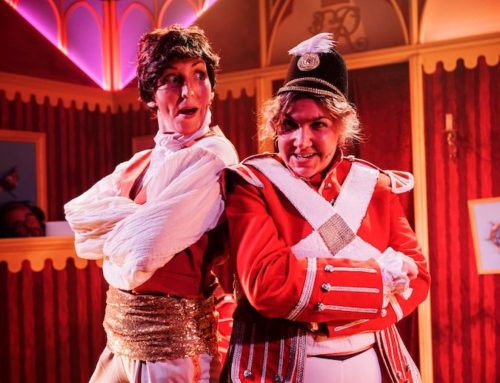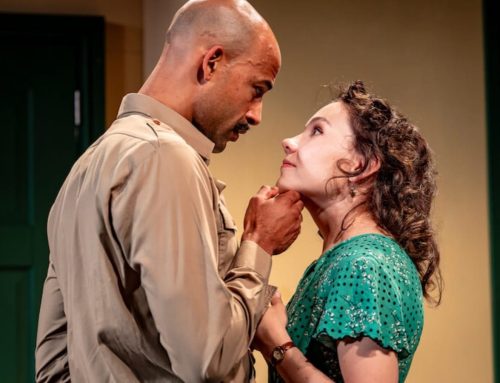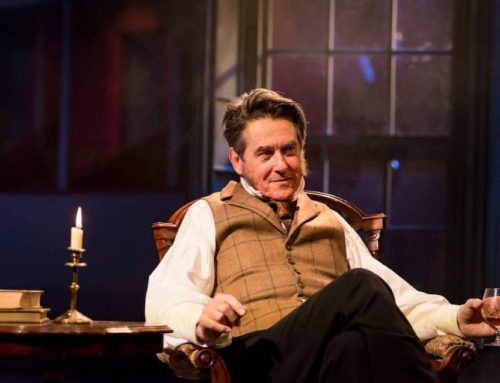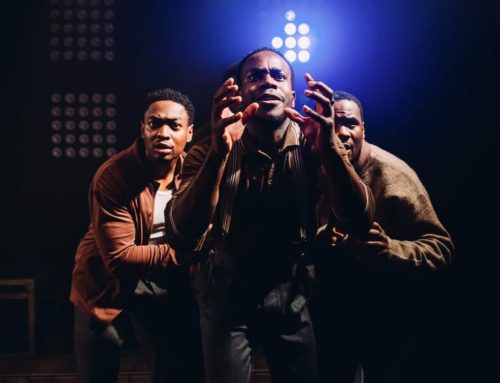If there is a central theme to the work of the hugely successful Italian director, screenwriter, and novelist Cristina Comencini it is an enduring fascination with the dynamics of family. Director and translator Aida Rocci brings a welcome English language version of Comencini’s 2006 hit comedy-drama Two Rounds (Due Partite) to London’s Jermyn Street Theatre.
Aided by tremendous performances all-round the four-hander has much to say about the deceptions, opacities, misunderstandings, and disappointments that mark out women’s relationships with their partners, children, parents, and each other. But the feminist message feels bleak, verging on dated, and one periodically wishes Rocci’s translation was a tad funnier.
It is the mid ‘60s. Middle class Italian foursome Claudia (Natalie Cutler), Beatrice (Daria Mazzocchio clad in saccharine-sweet Barbie-pink), Gabriella (Flora Sowerby) and Sofia (a stern and sympathetic Saria Steyl) are enjoying (perhaps enduring is a better word) their regular Thursday afternoon of cards, coffee, and bitching about “how unhappy they are”. Starved of careers and trapped in “the day-to-day monotony of the fundamental female experience” much of their babble is about what it might be like to be somebody else. Someone whose life is more than “seeing friends, making cakes and organising the drawers”.
One cannot help but sympathise with the quartet. Gregarious Gabriella has sacrificed her career as a concert pianist for the sake of her needy man-child husband Sandro, but at least she has “pills to keep her calm”. Smart and sassy Sofia’s double life with husband and lover, “in the one I do laundry and in the other I do Herman” she says, is falling apart at the seams. She is too scared of her own mother to do anything about it. Stuck with an inadequate man she finds significance in Sylvia Plath’s poetic suffering.
Meanwhile heavily pregnant Beatrice (a layered and penetrating performance from Mazzocchio) is petrified of giving birth and cannot quite understand why her academic husband commits more time to books than to her. Claudia (whose sense of baffled injustice is depicted immaculately by Cutler) wonders why husband Cesare is two-timing her and struggles to find anything good about being a mother. “Look what it’s done to us” she says as the women’s daughters happily play at being Princess Grace in the next room.
The familial undercurrents are drawn with finesse, but ultimately this is bleak stuff unleavened by much of the dark humour that typically characterises Comencini’s writing. Were Italian women’s lives ever quite this unremittingly melancholy? Perhaps the swinging sixties passed Rome by. Either that or it is grim down south.
Fast forward thirty years and the quartet’s daughters (each played by the same actor as the mother) meet in the aftermath of a family tragedy. On the surface power has shifted in women’s favour. But dig a little deeper and life is almost as banal and imperfect as 30 years previously.
Sara gets the music career her mother never had but is still stuck with an infantilised man. Paediatrician Rossanna finds empowerment healing the sick, but her romantic relationship is as empty as her mother’s ever was. Ceclia has ditched men entirely in favour of an IVF pregnancy (“I haven’t fucked in months, and I don’t give a fuck”). But inside she still yearns for a life that does not involve “waking up in tears hugging a pillow”. Gulia feels enabled enough to propose to her boyfriend but, like mum Beatrice, still cannot get her man to really commit. He likes “the clatter of dishes in the sink” more than he likes her, she says.
There is not a huge amount of narrative in Two Hands (it is more still-life than moving landscape) but there is momentum here and a recognisable and finely rendered inner life to the characters, a result of both subtle and understated direction from Rocci and pitch perfect performances from all four leads. Evelien Van Camp’s set, an oppressive backdrop of monochrome family snaps, evokes the ubiquity of family responsibility.
Can women ever have the lives they want? Close to two decades on from Two Hands first outing one hopes round three of the drama might see Claudia, Beatrice, Gabriella, and Sofia’s granddaughter finding more satisfaction in life, career, and partner than their forbears.
Writer: Cristina Comencini
Director: Aida Rocci
More Recent Reviews
Playfight. Soho Theatre.
Writer Julia Grogan’s breathtakingly assured debut play arrives at Soho Theatre following stellar reviews at the Edinburgh Fringe and [...]
All The Happy Things. Soho Theatre.
Naomi Denny’s three-hander comedy-drama All The Happy Things covers familiar themes within a recognisable premise. A grieving protagonist comes [...]
Telly. Bread and Roses Theatre.
The challenge with absurdist comedy is that many people do not find it funny. Laughing at the sheer weirdness [...]





